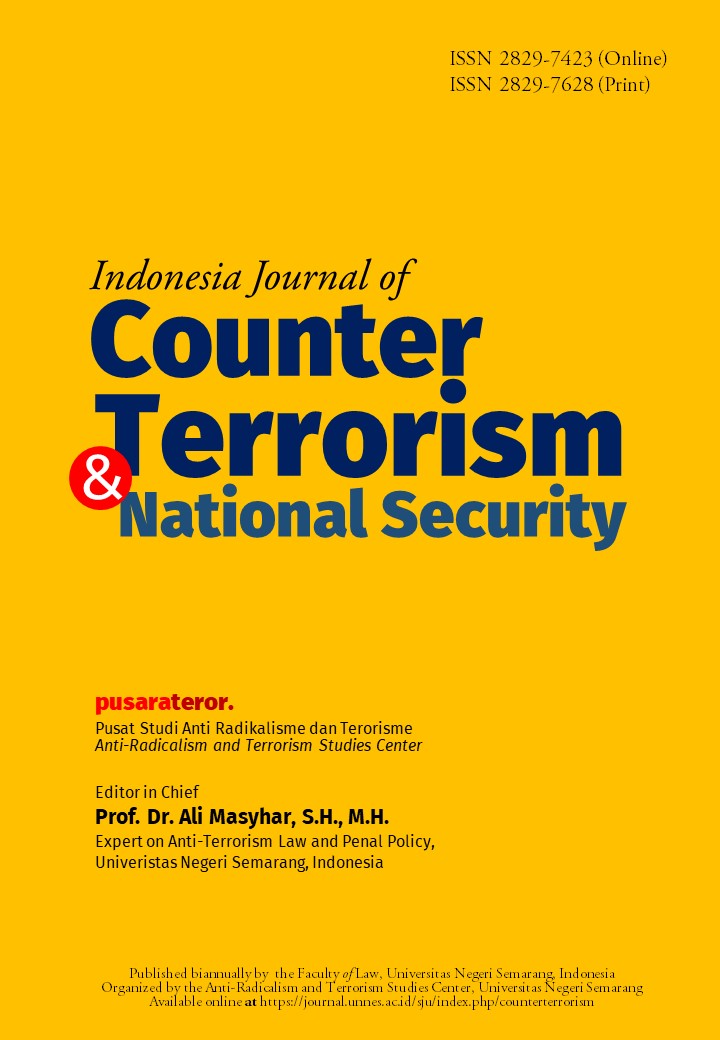Hoax and Fake News by Saracen Syndicate and the Problems for National Cyber Security
Main Article Content
Abstract
Along with the times, information technology has taken an important role in society. Information technology not only has a positive impact but also has a negative impact, this is what then gives rise to an idiom that we often hear together, that information technology is like a double-edged knife. On the one hand, with the existence of information technology, it encourages demand for products. the technology itself, such as computers, modems, facilities to build internet networks and so on, then facilitates business transactions, especially financial businesses in addition to other businesses. But on the other hand, the use of information technology also invites crime. Cybercrime is a form of virtual crime by utilizing computer media that is connected to the internet and includes everything related to criminal acts.
Article Details

This work is licensed under a Creative Commons Attribution-ShareAlike 4.0 International License.
References
Aritonang, Bonardo Marulitua. "Grup Facebook Hits from the 80's & 90's Sebagai Ruang Publik Menangkis Hoax dan Hatespeech." Cakrawala Jurnal Penelitian Sosial 7, No. 2 (2018): 179-204.
Cerezo, Ana I., Javier Lopez, and Ahmed Patel. "International cooperation to fight transnational cybercrime." Second International Workshop on Digital Forensics and Incident Analysis (WDFIA 2007). IEEE, 2007.
Febriansyah, Febriansyah, and Nani Nurani Muksin. "Fenomena Media Sosial: Antara Hoax, Destruksi Demokrasi, dan Ancaman Disintegrasi Bangsa." Sebatik 24, No. 2 (2020): 193-200.
Grabosky, Peter. "The global dimension of cybercrime." Global Crime 6, No. 1 (2004): 146-157.
Imawan, Khaerudin. "Jurnalisme Data Resistensi Ruang Siberdi Era Post Truth." Jurnal Signal 6, No. 2 (2018): 237-258.
Jones, Jeffrey P., and Geoffrey Baym. "A dialogue on satire news and the crisis of truth in postmodern political television." Journal of Communication Inquiry 34, No. 3 (2010): 278-294.
Kuntarto, Kuntarto, Rindha Widyaningsih, and Muhamad Riza Chamadi. "The Hoax of SARA (Tribe, Religion, Race, and Intergroup) as a Threat to the Ideology of Pancasila Resilience." Jurnal Ilmiah Peuradeun 9, No. 2 (2021): 413-434.
Kurniawati, Yunita Rahayu. "PertanggungJawaban Pidana Atas Penyebaran Berita Bohong (Hoax) di Media Sosial." Dinamika: Jurnal Ilmiah Ilmu Hukum 26, No. 4 (2020): 422-437.
Lee, Antony. "Online Hoaxes, Existential Threat, and Internet Shutdown: A Case Study of Securitization Dynamics in Indonesia." Journal of Indonesian Social Sciences and Humanities 10, No. 1 (2020): 17-34.
Marwan, M. Ravii, and A. Ahyad. "Analisis penyebaran berita hoax di Indonesia." Jurusan Ilmu Komunikasi, Fakultas Ilmu Komunikasi Universitas Gunadarma 5, No. 1 (2016): 1-16.
Mudawamah, Nita S. "Membekali Diri untuk Menghadapi Fenomena Post-truth." IJAL (Indonesian Journal of Academic Librarianship) 1, No. 3 (2018): 21-28.
Muthia, Fairuz Rhamdhatul, and Ridwan Arifin. "Kajian Hukum Pidana Pada Kasus Kejahatan Mayantara (Cybercrime) dalam Perkara Pencemaran Nama Baik di Indonesia." RESAM Jurnal Hukum 5, No. 1 (2019): 21-39.
Parker, Donn B. "The dark side of computing: SRI International and the study of computer crime." IEEE Annals of the History of Computing 29, No. 1 (2007): 3-15.
Pennycook, Gordon, and David G. Rand. "The psychology of fake news." Trends in Cognitive Sciences 25, No. 5 (2021): 388-402.
Potthast, Martin, et al. "Clickbait detection", in European Conference on Information Retrieval. (Chamb: Springer, 2016).
Putri, Aurellya Desita Ananda. "Pertanggungjawaban Pidana Komunitas Penyebaran Berita Bermuatan Sara Melalui Media Sosial." Jurist-Diction 4, No. 2 (2021): 543-558.
Salam, Aprinus. "The Hoax Phenomenon in Indonesian Society: Observing Anti-Diversity Memes since 2014." Humaniora 30, No. 3 (2018).
Schjolberg, Stein. "The history of global harmonization on cybercrime legislation–the road to geneva." Journal of International Commercial Law and Technology 1, No. 12 (2008): 1-19.
Siregar, Muhammad Ridwan, and Vesa Yunita Puri. "Relevansi Hate Speech Atas Dasar Agama Melalui Internet Dengan Cyber Terrorism." Justitia et Pax 33, No. 2 (2017).
Sofaer, Abraham D., et al. A proposal for an international convention on cyber crime and terrorism. (Stanford University, Center for International Security and Cooperation, 2000).
Sviatun, Olena V., et al. "Combating cybercrime: economic and legal aspects." WSEAS Transactions on Business and Economics 18 (2021): 751-762.
Tarmiji, Muhamad, "Strategi Komunikasi Polres Metro Jakarta Pusat dalam Kampanye Anti Hoax (Studi Kasus Sindikat Saracen)". Dissertation (Jakarta: Universitas Bakrie, 2018).
Utami, Pratiwi. "Hoax in modern politics: the meaning of hoax in Indonesian politics and democracy." Jurnal Ilmu Sosial dan Ilmu Politik 22, No. 2 (2018): 85-97.
